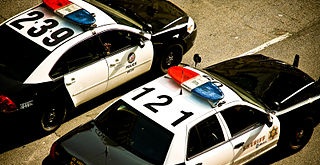Rialto, CA Police Made to Wear Cameras, Use of Force Drops by Over Two-ThirdsChris | InformationLiberationJul. 17, 2013 |
Popular 
VDARE Shutting Down Due to Witch Hunt by New York Attorney General Letitia James

Tucker Carlson Praises Noahide Laws: "They're Great!"

Republican Rep. Thomas Massie Says He Won't Attend Netanyahu's "War Rally," Tells Off AIPAC

Kamala Harris Pledges 'Unwavering Commitment' to Israel, Offers Palestinians Her 'Concern'

Democrats Revive Black Lives Matter One Day After Biden Endorses Kamala Harris for President
  When cops in a Rialto, California were forced to wear cameras, their use of force dropped by over two-thirds. Additionally, the officers who were not made to wear the cameras used force twice as much as those who did. This strongly suggests the majority of the time police use force is unnecessary. In other words, the majority of the time these officers used force they were simply committing acts of violence which they don't feel comfortable committing if it's captured on film. When cops in a Rialto, California were forced to wear cameras, their use of force dropped by over two-thirds. Additionally, the officers who were not made to wear the cameras used force twice as much as those who did. This strongly suggests the majority of the time police use force is unnecessary. In other words, the majority of the time these officers used force they were simply committing acts of violence which they don't feel comfortable committing if it's captured on film.From The New York Times: HERE'S a fraught encounter: one police officer, one civilian and anger felt by one or both. Afterward, it may be hard to sort out who did what to whom.Not only should every police officer should be forced to wear one of these cameras, their videos should be freely uploaded for crowd-sourcing by the general public on YouTube. If privacy for the general public is a concern, they could blur people's faces a la` Google street view. Police love to say if you're not doing anything wrong, what do you have to hide, yet all over the nation police unions virulently fight calls to force them to wear cameras. Fact is, most cops have everything and more to hide. Their job is to enforce criminally idiotic and anti-human laws written by criminal politicians, from the drug laws to thousands of idiotic regulations on the books, their job is no longer to arrest violent criminals and thieves but to aggress against non-violent, non-criminals -- which turns them into criminals themselves. Rather than focus on fighting crime, the majority of the millionaire cop next door's work consists of extorting the general public for cash. For example, speed limits have been shown to have no effect on road safety, yet when the speed limit is 65 instead of 55, revenue for cops drops dramatically, hence most places the speed limit is 55, of course the general public still drives 70 regardless. Think for a minute how idiotic their speeding laws are. It's called a "speed limit," yet everyone drives over them by at least a few miles per hour, this turns everyone into a so-called "criminal." Police can then pull anyone over and shake them down for cash as a result, though because people get outraged and it makes the news if they ticket people for driving just a few mph over the limit, they generally only shake down people driving 10 mph and above over the limit. Hence the limits are set artificially low. Meanwhile, at the same time, almost every time you see a cop driving on the road they're speeding and weaving around like a lunatic. These are stupid, idiotic laws, but of course, they were not written to be rational and uphold order, they were written to extort the general public of their hard earned money. Fact is, these days if any average person actually saw what the average cop does all day they'd be shocked and appalled. In fact, when they see glimpses of how police act when they're killing people's dogs and shooting unarmed woodcarvers they are shocked and appalled, they just don't realize these are not "isolated incidents" but instead the rule. _ Chris runs the website InformationLiberation.com, you can read more of his writings here. Follow infolib on twitter here. |



